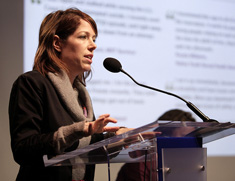-
Nancy Schwartzman on Fighting Rape Culture Worldwide With Emerging Social Technology
February 14, 2014 By Donald Borenstein
Sexual assault remains distressingly common throughout the world and too often it’s the victim who gets the blame, says Nancy Schwartzman, filmmaker and executive director of Tech 4 Good, in this week’s podcast.
Sexual assault remains distressingly common throughout the world and too often it’s the victim who gets the blame, says Nancy Schwartzman, filmmaker and executive director of Tech 4 Good, in this week’s podcast.
“A lot of services for young women tell them how to dress and to watch their drink,” she says. Schwartzman and Tech 4 Good are trying to change that through their Android and iOS app, Circle of 6, which Schwartzman believes cultivates a narrative of empowerment. “Our goal is to meet people where they are, which might be at a party with a lot of alcohol.”
Sexual assault and gender-based violence is a global phenomenon encountered by many international development programs. At least one in three teens in the United States report experiencing abuse in their relationshi, 67 percent of Mexican women report experiencing sexual or inter-personal violence, and nearly half of all women in Kenya experience rape in their lifetime, Schwartzman says.
“I Want My App to Connect to People”
Circle of 6 was created in response to a 2011 challenge from the White House to create a technological tool that addresses gender-based violence for college-age women. The app allows users to quickly and discreetly contact up to six friends using a pre-written message if they find themselves in an uncomfortable or dangerous situation. Users can send GPS information on their location, request a ride, or prompt a friend to call them in order to have an excuse to leave a conversation. Circle of 6 also contains regionally tailored information on emergency hotlines and information on healthy relationships and sexual assault.
“Circle of 6 is really the intersection of stories, privacy, and interactivity,” Schwartzman says. “A lot of apps will give you information [but] young people – myself included – that’s not how I like to use an app. I want my app to be interactive, I want my app to connect to people and really, truly in that way be social.”
Schwartzman believes developing a strong network of peers is critical to empowering young women, especially when local authorities often prove to be slow or non-responsive when it comes to sexual assault. Circle of 6 is “trying to not link our users to the police, because the police are not always safe spaces for victims,” she says:
We wanted to make something that was simple, that emphasized relationship and community building…We wanted to make this look like a game…so if someone is in an abusive relationship, and a boyfriend or partner is looking over their shoulder, it doesn’t look like a police/danger thing.
Global Reach
Mobile phones are now nearly ubiquitous, and in parts of the world, they’re helping to connect and empower previously marginalized women. Nine out of ten women report they feel safer because of their phones, 87 percent of citizens in Africa own mobile phones, and 90 percent of college students say texting is an important part of building friendships, Schwartzman says.
Circle of 6 has gained a significant amount of traction, particularly on U.S. college campuses and in urban areas. Schwartzman says they have recently stepped up efforts in India too. The high-profile gang-rape and murder of a girl in New Delhi in 2012 was a major catalyst. “We had 400 users…and it spiked up to 3,000 in a month,” she says. Overall, the app now has more than 100,000 users in 32 different countries.
While Schwartzman still sees some challenges in making the app effective everywhere – Circle of Six’s efforts are now focused on making resources available for non-smartphone users and tailoring the app to be more useful for women living in rural areas – she believes it can make a positive impact. The key, she says, is giving young women the information they need to defend their personal rights. “Young people go to each other in a peer to peer model…and that can be disastrous if the peers are uninformed.”
Nancy Schwartzman spoke at the Wilson Center on December 9. Download her slides to follow along (Warning: Some images may be disturbing to some viewers).
Friday podcasts are also available for download on iTunes.
Topics: Africa, Asia, community-based, development, Friday Podcasts, GBV, gender, global health, India, mobile technology, podcast, U.S., youth
 A Publication of the Stimson Center.
A Publication of the Stimson Center.




